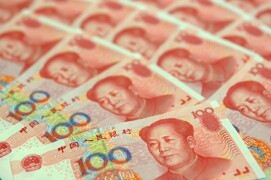Home / Forex news / Chinese Yuan Flat As PBoC Pumps $56 Billion Liquidity for SMEs

The Chinese yuan is trading relatively flat to kick off the holiday-shortened trading week. China continued to employ monetary policy measures to resuscitate the worldâs second-largest economy in the coronavirus fallout. One mechanism Beijing is utilizing to spur business activity is bank lending, offering credit to businesses â large and small. Will it be enough for companies to borrow and restart operations?
The Peopleâs Bank of China (PBoC) recently announced it is cutting the reserve requirement ratio (RRR) for the second time in less than a month. The central bank confirmed on its website that it will reduce the RRR for small banks by 100 basis points in two steps: one on April 15 and the other on May 15. The latest move would decrease the RRR for the roughly 4,000 small- and medium-sized banks to 6%.
By lowering the RRR â how much banks are required to hold in reserves â Beijing injects $56.38 billion in liquidity.
In a separate move, the PBoC lowered the interest rate on banksâ excess reserves with the central bank from 0.72% to 0.35%. This would come into effect on April 7. This comes a week after it cut the rate on its seven-day reverse repurchasing agreement by 20 basis points from 2.40% to 2.20%, which injects $7.1 billion into the banking system.
A recent Caixin survey found that a lot of small and privately-owned companies with less cash on hand are having a difficult time returning to normal. Many of these smaller businesses, especially those involved in the services sector, are cutting jobs at the fastest rate in 15 years. Since China has a track record of forcing large, state-owned enterprises (SOEs) to absorb small businesses, will Beijing choose to bail out these firms, even if they have been zombified?
Meanwhile, the PBoC warned that the global economy could slip into a second Great Depression as a result of the COVID-19 pandemic. Although experts say that the chances of a repeat of the 1930s are low, the PBoC believes it should not be ruled out.
Zhu Jun, director of the international department at the PBoC, said in a statement:
The possibility of a âGreat Depressionâ cannot be ruled out if the epidemic continues to run out of control, and the deterioration of the real economy is compounded by an eruption of financial risks.
Jamie Dimon, the CEO of JPMorgan Chase, believes the economy is in for a âbad recessionâ plus âfinancial stressâ comparable to the 2008 financial crisis. He wrote in his annual letter to shareholders:
We donât know exactly what the future will hold â but at a minimum, we assume that it will include a bad recession combined with some kind of financial stress similar to the global financial crisis of 2008. Our bank cannot be immune to the effects of this kind of stress.
The USD/CNY currency pair was unchanged at 7.0923. The EUR/CNY rose 0.1% to 7.6721, from an opening of 7.6643, at 13:46 GMT on Monday.
If you have any questions, comments, or opinions regarding the Chinese Yuan, feel free to post them using the commentary form below.
Original from: www.earnforex.com
No Comments on “Chinese Yuan Flat As PBoC Pumps $56 Billion Liquidity for SMEs”